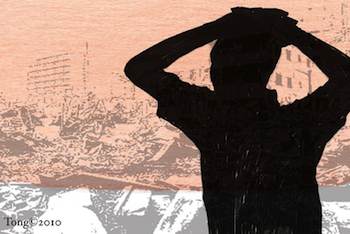- MENU
- HOME
- SEARCH
- WORLD
- MAIN
- AFRICA
- ASIA
- BALKANS
- EUROPE
- LATIN AMERICA
- MIDDLE EAST
- United Kingdom
- United States
- Argentina
- Australia
- Austria
- Benelux
- Brazil
- Canada
- China
- France
- Germany
- Greece
- Hungary
- India
- Indonesia
- Ireland
- Israel
- Italy
- Japan
- Korea
- Mexico
- New Zealand
- Pakistan
- Philippines
- Poland
- Russia
- South Africa
- Spain
- Taiwan
- Turkey
- USA
- BUSINESS
- WEALTH
- STOCKS
- TECH
- HEALTH
- LIFESTYLE
- ENTERTAINMENT
- SPORTS
- RSS
- iHaveNet.com
Kara C. McDonald

The
Launching another complex operation in Haiti will be building on Troy. Responders will arrive in an environment rife with the unfinished business of international operations that have come before. Indeed, it is hard to identify another country that has had as many peacekeeping forces, stabilization operations, and crisis responses at work in the last three decades. The quake must not become yet another opportunity to fail.
The Crucial U.S. Response
President Barack Obama pledged
But it will be critical in the next forty-eight hours that U.S. authorities grasp the full spectrum of the quake's impact to ensure and mount a corresponding response. From potential refugee flows to political instability to the potential for an outbreak of disease or street violence and crime, the international response must take into account not only immediate needs -- reducing suffering and saving lives -- but the quake's impact on the longer-term trajectory of the country.
To that end, the United States must coordinate closely with the UN and other donors to identify a coherent division of labor and to leverage what can be salvaged of ongoing international operations there. As the largest donor country and a neighbor, the United States will be looked to for leadership in the response. The United States in turn should spare no asset and lend its considerable response capacity, including airlift, command and control structures, medical mercy ships, and civilian and military disaster response teams.
A History of Aid Futility
Inconsistencies and gaps across multiple international interventions have been one cause of ineffectiveness in past operations in Haiti. The fragility of Haiti's economic, social, and political stability begs for a response that blends relief, development, and stabilization efforts. Much will depend on the ability to coordinate and move assets across these pillars. Emergency response in Port-au-Prince will be incomplete and unsuccessful without this full-spectrum approach.
Disasters in conflict-prone settings can easily exacerbate political fault lines over the months of recovery -- all the more reason emergency responders, development experts, and policymakers be linked up in their efforts. In a statement less than one week ago, UN Special Representative Annabi spoke of the logistical hurdles of presidential and legislative elections set to begin
Policing and rule of law in the aftermath of the crisis, a lesson from the 2004 Indian Ocean tsunami and 2005 Hurricane Katrina responses, could also become a priority in the response. MINUSTAH's principal focus prior to the quake, providing security and training Haitian police, will undoubtedly turn in immediate days toward emergency response, even while it may be called upon to provide much-needed security over coming months. The United States should be prepared to assist MINUSTAH in its mandate, especially in the event of an uptick in violence and crime in the aftermath of the quake.
The crisis will test the Obama administration's ability to respond across this humanitarian and developmental context. That security can be threatened by natural disasters, political instability, or poverty is a mantra in twenty-first century development circles, but in Haiti, it's all of the above.
Hope for Renewed Commitment
While an obvious setback to Haiti's political and economic process, the disaster also provides an opportunity. Annabi last reported to the
The desire to move fast and "do something" must be matched to what is a bitter opportunity to secure a more consistent and lasting commitment to Haiti's political and social stability. Above all, this disaster is a reminder that the patchwork response to Haiti's problems that ebbs and flows with its crises must end now.